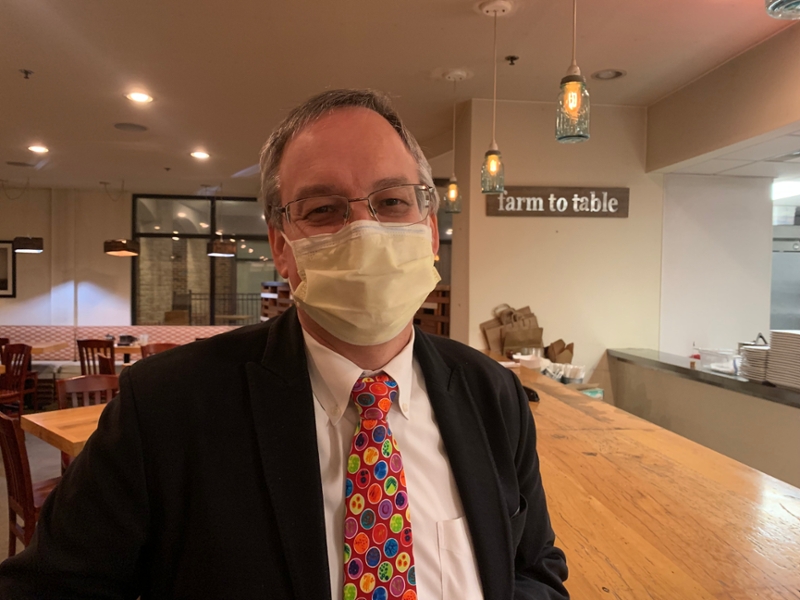Dean's Update
January 21, 2022 - Aron Sousa, MD
Friends,
 I am going to try to thread the eye of a needle today. On either side of the needle, we need to flatten the COVID-19 curve to help our health systems and protect those still at risk, whether vaccinated or not – ICU use is approaching levels seen in previous surges, and even if cases are decreasing, there are as many sick people on the downslope of a surge as on the upslope.
I am going to try to thread the eye of a needle today. On either side of the needle, we need to flatten the COVID-19 curve to help our health systems and protect those still at risk, whether vaccinated or not – ICU use is approaching levels seen in previous surges, and even if cases are decreasing, there are as many sick people on the downslope of a surge as on the upslope.
But if you put on your cheaters and squint a little, you can see the space in the eye of the needle. This is a space where omicron and available vaccination put us on the verge of a reasonable version of a new, livable world with endemic COVID-19. I’m planning to double over the thread, pinch the needle between my thumb and forefinger, put the thread right there in the endemic space.
But first, let’s review the concerns. The unvaccinated remain, as ever, at risk. People with serious medical conditions, people who are immunosuppressed, and people who are quite old are all at risk from COVID-19 even if they are vaccinated. Back in November, I took care of someone with significant cancer who died of COVID-19 despite being vaccinated. They had been on chemotherapy and were immunosuppressed, so their immune system probably did not respond effectively to the vaccine and, once infected with COVID-19, their immune system could not fight off the virus well enough. Despite getting their shots, people in these situations are functionally not immune in the way people are with a successful vaccine series and booster. Data from South Africa (warning, pre-peer review) suggests that while omicron may be somewhat less severe than delta for the non-immune, it is still bad.
On to the endemic world. We all need to protect those at risk, but for the vaccinated, endemic COVID-19 is beginning to look like other diseases we’ve dealt with for a long time. According to a CDC analysis of 1.2 million people in a private, U.S. health system, who finished primary vaccination between December 2020 and October 2021, about 15 per 100,000 vaccinated people had a severe COVID-19 outcome including the 3.3 per 100,000 who died. I don’t know if that seems like a large number to you, but I don’t find it too surprising – remember I lost a vaccinated patient last fall. The CDC estimates flu deaths each year, and in the last decade estimated deaths have ranged from 12-52 thousand per year. That converts to a range of 3.6-15 deaths per 100,000 Americans. The people most at risk from influenza are also older and the risk for those over 65 is much higher than for those younger than 65. The same is true in COVID-19.
I’d like to suggest that for vaccinated people, their risk of death from the delta variant of COVID-19 and influenza are in the same realm, or even lower, as the average American’s risk from flu. This data is from before omicron, but omicron should have a lower risk to the vaccinated than delta. Not everyone is the same, to be sure, and some vaccinated people are at increased risk from COVID-19 and from influenza. And like influenza, COVID-19 is going to be with us for many generations; we need to figure out how to open schools and return to the office despite persistent COVID-19.
No doubt we should have been more aggressive in prior years with flu, and perhaps COVID-19 will change us in ways that help us protect people from flu as well:
- Do not go to work sick
- Be vaccinated
- Wear a mask if you must be out in the world while you are sick
- Wash your hands
- Be careful around people at risk
In addition, we need more telehealth to get people health care while they, or their provider, are sick; better systems for reporting, collecting, and tracking health data; and better communication about science.
Hopefully, this counts as a threaded needle and we can go on to some quilting.
I hope you all had a chance to virtually attend the health colleges’ MLK Celebration and the recent DEI Grand Rounds with College of Human Medicine students.
The university is set to return to in-person classes on January 31. I think this is the right thing to do, and we are all going to need flexibility and to be flexible during our transition back to more in-person classes. We can predict that people will still get sick or the people they care for will be sick, and we need to help each other. Based on my experience, I have every confidence we will step up for each other.
Please wear a surgical mask or better, be vaccinated and boostered, and stay home if you are sick.
Next week should have a fair amount of news in it, so consider yourself warned.
Serving the people with you,
Aron
Aron Sousa, MD
Interim Dean

